|
||||||||
|
|
|
2015-10-27 ArtNo.45532
◆Review:The baptism of the Holy Spirit (Guest and host are obvious)
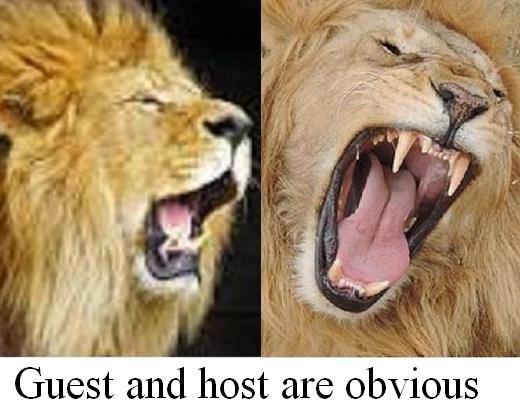 One day the head monks of the two halls had met and at the same moment each had given a shout. A monk asked Master LinJi, "Was there a guest and a host?" "Guest and host were obvious," replied Master LinJi. (LinJi Lu) ○Jesus suddenly began to waver Jesus entered Jerusalem riding on a donkey as the king of Israel. However, he suddenly began to waver and be troubled after being paid a visit by some Greeks and he said, "Now my heart is troubled, and what shall I say? 'Father, save me from this hour'? No, it was for this very reason I came to this hour." (John 12:27) Thereafter he had open debates with Pharisees, Sadducees and Herodians in the temple. Then he held the Last Supper with his twelve apostles. However, Jesus' agony looks to have been growing more during these events and reached a climax in the prayer of Gethsemane and the screaming on the cross, "Eloi, Eloi, lama sabachthani?--which means, My God, my God, why have you forsaken me?" (Mark 15:34, Matthew 27:46) Therefore, a situation different from the scenario Jesus had drawn, occurred after his entering Jerusalem. as the king of Israel. ○The Church Movement was not monolithic Why did such situation occur? The main cause seems to have been that the Crucifixion plan was prepared by various sects who struggled with each other. Although Jesus tried to carry out his own plan taking advantage of these struggles, the Church Movement itself, in which Jesus had determined to take the lead, was not monolithic. This movement constituted not only Hellenists who were familiar with the Greco-Roman culture, such as Luke from Macedonia and Barnabas from Cyprus, but also seems to have included people who had held the faith even closer to Jewish fundamentalism than Hebraists (Jews who spoke Hebrew fluently), for example, members of the Synagogue of the Freedmen-Jews of Cyrene and Alexandria as well as the provinces of Cilicia and Asia. (Acts 6:9) 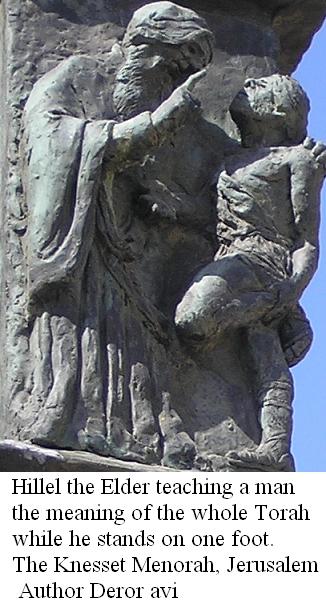 ○The Essenes opposed Temple priesthood While the venue where Jesus and his Twelve Apostles' Last Supper took place is said to have been the meeting place of the Essenes who opposed temple priesthood, Jesus' younger brother James, who is said to have been a priest of the Nazarite, one of the fundamentalist sects, and to have entered into the holy areas of the Temple to function as "high priest" to his followers, seems to have had a close relationship with the Sadducees, a sect of priest class led by the high priest Caiaphas and his father-in-law Annas, the ex-high priest. The sect of Essenes is said to have been organized by the supporters of Rabbi Hillel. He taught, "The love of God and the love of one's neighbor are one: that is the whole Torah," and was recognized as the highest authority among the Pharisees. Paul, who described himself a Pharisee, studied to Gamaliel, the grandson of Hillel and is said to have had relationship with members of the Synagogue of the Freedmen-Jews. 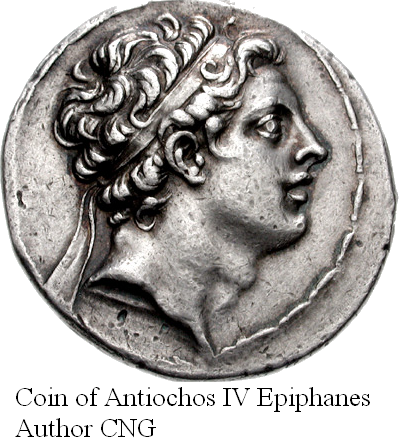 ○The origins of the Pharisees and the Sadducees The origin of the Pharisees can be traced back to a group that questioned the legitimacy of the high priest and protested when Jason of the Oniad family was appointed to the high priest by the Seleucid king Antiochus IV Epiphanes. Successors and the supporters of Jason, who was condemned as "evil priest" by them, was called the Sadducees. These sects, which were incompatible as oil and water, seems to have had prepared different Crucifixion plan respectively toward the Passover of the year. Though Jesus was trying to carry out his own plan, the things were changing constantly and then a situation different from the scenario originally painted by Jesus might have occurred. If you stand in the beginning where the Word was with God, and the Word was God, in other word, stand on the absolute axis, you can witness grass, trees and the domains of all living things, all attain buddhahood through out of past, present and future. Jesus was proud to have been sent to this world in order to convey this ultimate gospel and thought that he had been the protagonist and the scenario writer of Crucifixion plan. However, the relative world is too uncertain. Here today, gone tomorrow. Thus, even Jesus seems to have been faced with unexpected things and to have been in anguish. 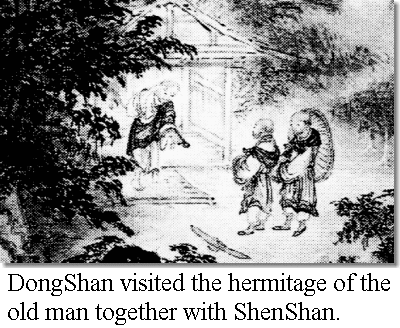 ○Guest and host are obvious Once upon a time DongShan LiangJie (807-869), the founder of the Soto School of Zen Buddhism, was making a pilgrimage with a schoolmate ShenShan SengMi along the mountain stream of Longshan (Mount Dragon) near Zhangsha City in Hunan province of China. DongShan spoke to ShenShan, "There must be hermits in this deep mountains," being fascinated by a spectacular view of the abyss. Just as he expected, when they went two or three km, an emaciated old man beckoned them and called, "There is even no trail in this mountain, where on earth are you going?" DongShan replied, "You say 'There is even no trail.' How then did you come here?" "I was born neither of cloud or water," the old man answered. DongShan asked, "How long have you lived here?" The old man said, "I have already forgotten such as spring and autumn. (I'm timeless.)" Then DongShan said, "Which is the first you or this mountain?" "I don't mind," the old man shrugged off. DongShan asked persistently, "Why you don't mind?" The old man replied, "I am not the ragtag and bobtail in this world such as you." DongShan retorted without losing, "Why then did you dwell in this mountain?" The old man replied, “I saw two clay oxen fighting until they entered the ocean. Since then there has been no news of them." After hearing this answer, DongShan stood up straight and entreated him to preach. He visited the hermitage of the old man together with ShenShan and did the following questions and answers with the old man (Zen Master LongShan). DongShan: How is the guest within the host? (How is the guest's view of the host?) LongShan: Green Mountain covers white clouds DongShan: How is the host within the host? (How is the host's view of the host?) LongShan: For many years do not go out. DongShan: How far between the host and the guest? LongShan: Waves of the Yangtze River Water. DongShan: What word is there when the guest and the host see each other? LongShan: Pure wind is blowing under the bright moon. After finishing the questions and answers, DongShan asked the old man let him stay there. Because he wanted to study more from the old man. However, the old man smiled and said, "When I live in this thatched hut which has been isolated from the past, present and future, all things are illuminated by the God light, and become dead calm. Thus I can be immersed in the frontier of nirvana. It should not be viewed as pros and cons. It should be stopped to pry into earthborn affairs. That is the heart of the secluded life." [Recorded Sayings of Dongshan] ○Jesus' different instructions Jesus initially instructed his disciples to return to Galilee after his crucifixion. (Mark 14:28,16:7, Mat 28:7,10) However, according to the Acts of the Apostles, Jesus gave a new instruction, "Stay in Jerusalem," after the Resurrection. (Acts 1:4) At the Last Supper, Jesus, who had originally planned to return to Galilee earlier than his disciples, told Judas Iscariot his intention to be crucified as initially planned, even though it was impossible for him to return to Galilee after the Crucifixion. Then Judas immediately reported it to the high priest Caiaphas who had lived in next door to the venue of the Last Supper. 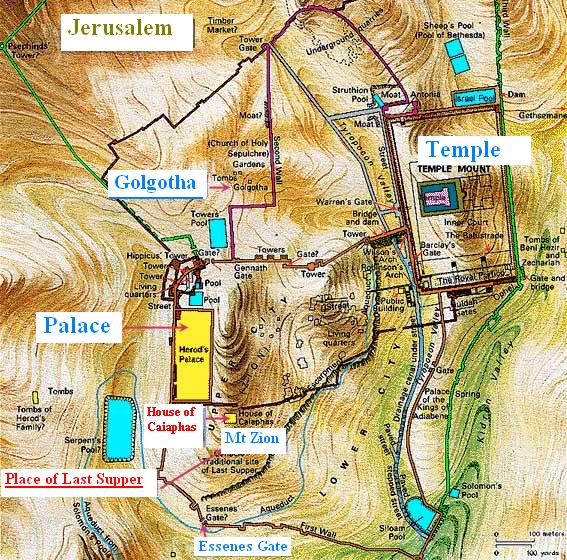 ○Little mentioned the mainstream of Jerusalem Church Even after the Primitive Church led by James the Less, the brother of Jesus, was established hard on the heels of the Crucifixion, the factions seem to have continued to struggle with each other. According to "The Acts of the Apostles," while the group led by Peter and John, seems to have based their activities on the meeting place of the Essenes and involved in missionary work, James the Less, and other younger brothers of Jesus, such as Matthew, Simon and Judas, who seem to have been certified as the legitimate lineage of the High Priest representing both the Davidic royal family as well as a priestly Aaronic Lineage, were unlike to have frequently entered into the meeting place of the Essenes who had opposed Temple priesthood. This may be one of the reasons that the Acts of the Apostles little mentions their (Jesus' brothers) activities. These disciples, who constituted the mainstream of Jerusalem Church, seem to have based their activities in the temple and have played a major role in establishment of liturgical of Church, such as "The Lord's Prayer." The Acts of the Apostles not only little mentions activities of the mainstream of Jerusalem Church led by James the Less, but also describes them as "savage wolves" citing the words of Paul. (Acts 20:29) However, it is possible that James who seems to have had a profound influence in the entire religious community of Jerusalem, might have exercised his influence behind following incidents. After execution of Jesus, the group led by Peter and John based their activities on the meeting place of the Essenes just behind the High Priest residence and immediately started the missionary work. They were not only allowed to frequently enter the temple but also given opportunity to testify in Sanhedrin. And James also seems to have exercised his influence behind the episode that Peter escaped from the prison with an angel's help. The two factions within the mainstream, that is, the group of the Nazirite led by James the Less and his brothers and the other group led by Peter and John (the former disciples of John the Baptist) carried out their activities in the inside and outside of the temple respectively as the two wheels of the Jerusalem church. This appears to be the main reason for the Jerusalem Church to realize a great success, such as, the enrollment of its inauguration day reached as many as 3,000. However, such success also resulted in jealousy of other factions. And non-mainstream factions of the Jerusalem Church, for example, the former disciples of John the Baptist and the Essenes except Peter, Andrew and John, faced persecution and James the Greater and Stephen fell sacrifice to it. However, James the Less seems not to have exercised his enormous influence to save them. And this may be another reason that the Acts of the Apostles little mentions Jesus' brothers' activities. Meanwhile, the Gnostic group, such as Thomas, Philip, etc. seems to have been shy away from the idea with strong political color as such "calling back the scattered children of God, to bring them together and revive Israel" from the beginning.<To be continued.> 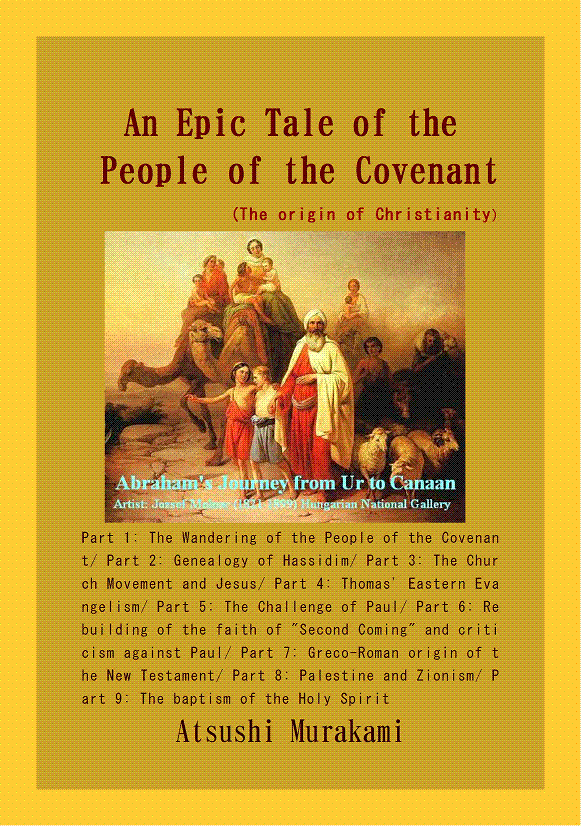 ○What is "Baptism with The Holy Spirit"? According to the dialectic of the Gospel of John, 【Thesis】"A man can possess eternal life through accepting testimony of the Son of man and being baptized by him." (John 5:24) 【Anti-thesis】But "The one who comes from the earth cannot accept the testimony by one from heaven."(John 3:32) How then can a man possess eternal life? 【Synthesis】"If you want to be baptized with the Holy Spirit, you can just go back to the word which was with God in the beginning (John 1:1) and certify that God is truthful. (John 3:33)" When he said, "You are Huichao," Zen Master Fayan thrusted vivid Self in Huichao in front of his eyes. (P.171) Purchase here Your Comments / UnsubscribeSEAnewsFacebookSEAnewsGoogleSEAnews eBookstore(Google)SEAnews world circulation |
|
[Your Comments / Unsubscribe]/[您的意见/退订]/[ご意見/配信停止]
Please do not directly reply to the e-mail address which is used for delivering the newsletter. 请别用递送新闻的邮件地址而直接回信。 メールをお届けした送信専用アドレスには返信しないで下さい。 |